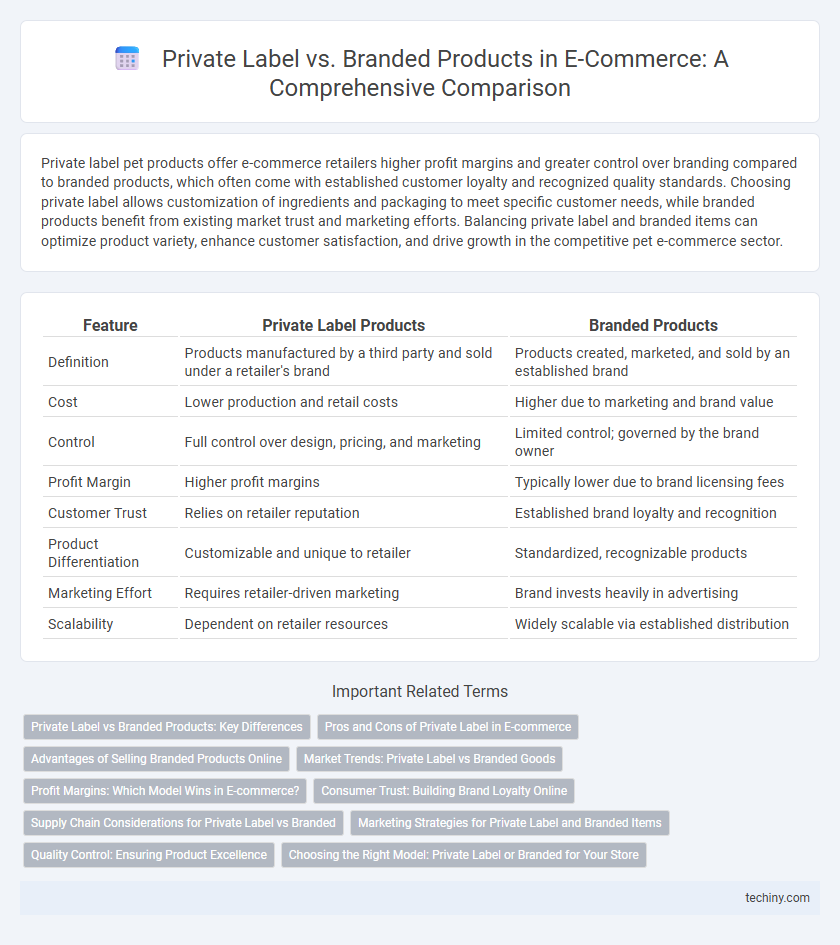Private label pet products offer e-commerce retailers higher profit margins and greater control over branding compared to branded products, which often come with established customer loyalty and recognized quality standards. Choosing private label allows customization of ingredients and packaging to meet specific customer needs, while branded products benefit from existing market trust and marketing efforts. Balancing private label and branded items can optimize product variety, enhance customer satisfaction, and drive growth in the competitive pet e-commerce sector.
Table of Comparison
| Feature | Private Label Products | Branded Products |
|---|---|---|
| Definition | Products manufactured by a third party and sold under a retailer's brand | Products created, marketed, and sold by an established brand |
| Cost | Lower production and retail costs | Higher due to marketing and brand value |
| Control | Full control over design, pricing, and marketing | Limited control; governed by the brand owner |
| Profit Margin | Higher profit margins | Typically lower due to brand licensing fees |
| Customer Trust | Relies on retailer reputation | Established brand loyalty and recognition |
| Product Differentiation | Customizable and unique to retailer | Standardized, recognizable products |
| Marketing Effort | Requires retailer-driven marketing | Brand invests heavily in advertising |
| Scalability | Dependent on retailer resources | Widely scalable via established distribution |
Private Label vs Branded Products: Key Differences
Private label products are manufactured by a third party and sold under a retailer's brand, offering cost-effective customization and higher profit margins. Branded products are developed and owned by manufacturers, relying heavily on brand reputation and extensive marketing to command premium prices. Key differences include control over product design, marketing strategies, and customer loyalty, with private labels providing flexibility and branded products leveraging established market trust.
Pros and Cons of Private Label in E-commerce
Private label products in e-commerce offer higher profit margins and greater control over product quality, allowing sellers to differentiate their offerings and build brand loyalty. However, they require significant upfront investment in product development, inventory management, and marketing to establish trust and compete with established branded products. Limited brand recognition and the risk of lower initial sales volume pose challenges compared to well-known branded items, which benefit from existing consumer trust and market presence.
Advantages of Selling Branded Products Online
Selling branded products online offers increased consumer trust due to established brand recognition and perceived quality, leading to higher conversion rates and customer loyalty. Branded products often benefit from existing marketing efforts and brand equity, reducing the need for extensive promotional investment from sellers. Additionally, these products typically command premium pricing and enjoy better visibility on e-commerce platforms through sponsored listings and organic search rankings.
Market Trends: Private Label vs Branded Goods
Private label products have experienced significant growth in e-commerce sales, capturing a larger market share due to competitive pricing and increased consumer trust. Branded goods maintain strong loyalty and perceived quality, particularly in premium segments, but face pressure from private labels' agility and direct-to-consumer strategies. Market trends show a shift towards private labels leveraging data analytics and personalized marketing to challenge established brands across categories like apparel, electronics, and household goods.
Profit Margins: Which Model Wins in E-commerce?
Private label products typically offer higher profit margins in e-commerce due to lower production and marketing costs compared to branded products, which often require substantial advertising budgets and licensing fees. E-commerce sellers can control pricing and branding strategies with private labels, enabling better margin optimization and scalability. However, established branded products benefit from customer loyalty and perceived value, occasionally justifying premium pricing and sustaining competitive margins despite higher operational costs.
Consumer Trust: Building Brand Loyalty Online
Private label products often leverage competitive pricing and tailored offerings to attract budget-conscious consumers, but branded products benefit from established reputations that foster stronger consumer trust and repeat purchases. Online brand loyalty hinges on consistent quality, transparent customer reviews, and effective digital marketing strategies that reinforce a product's identity and reliability. Building consumer trust in e-commerce requires transparent communication, responsive customer service, and seamless user experience, which branded products typically excel at due to their existing brand equity.
Supply Chain Considerations for Private Label vs Branded
Supply chain considerations for private label products emphasize greater control over production, sourcing, and customization, enabling cost efficiency and flexibility in inventory management. Branded products often rely on established supplier networks and standardized logistics, which can limit adaptability but ensure consistent quality and faster market entry. Private label supply chains require robust coordination between manufacturers and retailers to manage lead times, quality control, and demand forecasting effectively.
Marketing Strategies for Private Label and Branded Items
Marketing strategies for private label products emphasize cost-effectiveness, targeting niche markets through personalized branding and value-driven messaging that fosters customer loyalty. Branded product marketing leverages established brand equity, extensive advertising campaigns, and emotional appeal to differentiate from competitors and justify premium pricing. Data-driven insights and consumer behavior analytics play crucial roles in optimizing promotional spend and tailoring content for both private label and branded item campaigns.
Quality Control: Ensuring Product Excellence
Private label products offer e-commerce retailers greater control over quality standards by directly managing manufacturing processes and supplier selection, enabling tailored product specifications and consistent customer satisfaction. Branded products rely on established brand quality assurance protocols, which may limit the retailer's influence over production but leverage brand reputation and trust. Effective quality control in private label products directly impacts customer loyalty and reduces return rates, while branded products benefit from recognized quality benchmarks and marketing advantages.
Choosing the Right Model: Private Label or Branded for Your Store
Selecting between private label and branded products hinges on factors like profit margins, control over product quality, and brand identity development. Private label products offer higher profit potential and customization, enabling e-commerce stores to build unique brand recognition and customer loyalty. Branded products benefit from established market trust and consistent demand, reducing marketing efforts but limiting differentiation and pricing flexibility.
Private label vs Branded products Infographic

 techiny.com
techiny.com